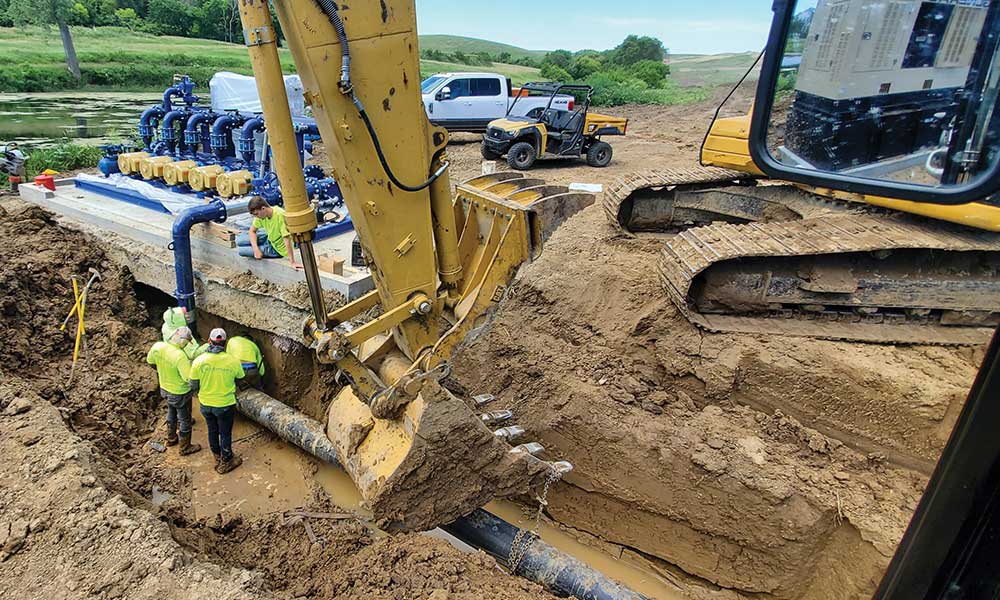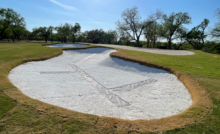Winterberry Irrigation’s Super-Sized Project in Nebraska


Winterberry Irrigation Landmand project
In golf course construction, bold visions call for exemplary contractors to get the job done. Rarely, if ever, has the vision for building an eighteen-hole golf course been bolder than that of Will Andersen’s dream of seeing the Landmand Golf Course carved out of his family’s Nebraska farmland. To say that the land, shaped prehistorically by glacial ice and historically by the errant ways of the Missouri River, is dramatic, doesn’t feel as if one has said enough.
Without question, from conception to build out, Landmand has followed an atypical path. Contractor Scot Leavitt, Co-Owner/Partner of Winterberry Irrigation, the company responsible for installing a robust and reliable irrigation system across the property’s steep slopes, puts the Landmand project in perspective, saying, “It is the most intense project I have been on in my life. Maybe the most intense I ever will be on.”
To understand all that makes Landmand’s design and construction such a distinctive golf course, you have to start at the beginning, with a ten-year-old Nebraska farm boy who was introduced to the game by his golf-loving grandfather, Bill Zellmer.
The Vision of Will Andersen
There are outstanding golf courses in the Cornhusker State, but in the rugged farm country where the Missouri River separates eastern Nebraska from Iowa, big-scale farming dominates. When Will Andersen was growing up in Homer, (population less than 500), his high school did not offer a golf team until Will’s father, Bryce Andersen, took the matter before the local school board.
Following graduation, Will attended the Professional Golfers Career College in Temecula, California, and later earned a degree at the University of Nebraska. After working as an assistant pro in Chicago, Will chose to leave city life behind and return to the wide-open spaces of Dakota County, Nebraska.
Although he returned to the family’s farm business, Will loves golf. He was the Medalist qualifier for the 2015 U.S. Mid-Amateur and won the Prairie Dunes Club Championship in 2017. For years, Will has put string trimmers and farm equipment to work, creating golf holes for his buddies and him to play on the farm.
In 2012, Will and Bryce rebuilt Old Dane Golf Club in nearby Dakota City. Will handled the nine-hole course routing at Old Dane, while his family farm business took care of much of the renovation. Yet, Will never stopped thinking about nearly 600 acres of land on his family farm that, to his mind, begged to be shaped into a spectacular eighteen-hole course.
The Best Team for a Big Job
Once the Andersen family made the decision to build the course, hiring a golf course architect who shared Will’s vision and finding the right construction crew for the job were pivotal next steps. The process wasn’t entirely painless. After talking with several companies that were not a good fit, Will, spurred on by a friend, contacted golf course architect Rob Collins. An email, a visit and the next thing you know, Landmand was under contract to be designed by Rob and be built in conjunction with Rob’s business partner, Tad King.
King-Collins Golf Course Design is an overnight success story more than a decade in the making. Their work on Sweetens Cove in southeastern Tennessee has brought them to the forefront of golf course design. They embraced the rugged terrain of the Andersen farm and did not back away from the self-funded project being built in a location that, by the standards of many people, would be described as being in the middle of nowhere.
Strategically, the project moved forward. Accustomed to moving earth, laying irrigation lines for crops, and other activities of grand-scale farming, the Andersen family planned to handle parts of the project themselves. They purchased two Caterpillar D8 dozers, two Caterpillar crawler dozers, two excavators, two Ashland 175XL scrapers, and a Finn T120 hydroseeder. And when it came time to lay the irrigation lines, they started the work themselves after hiring EC Design Group and Erik Christiansen, ASIC, to do their irrigation design.
“EC Design Group did a phenomenal design,” said Scot Leavitt. “My business partner and the company’s co-owner, Chris Daigle, and I were honored to work with Erik and his team. I also think the Andersens were really glad to see our Winterberry Irrigation team when we showed up. Bryce and Will are experienced in farmland irrigation. But installing 14-inch, high-density polyethylene irrigation for this sprawling golf course with its steep elevations was an entirely different matter.
“The land is amazing, but it’s elevation changes meant that we needed to push water uphill and then control the flow of it back down using a booster pump and pressure reducer valves. We started on June 1, 2020 and wrapped up our work on the thirty-first of October. It felt like the prairie winds blew the whole time we were working. We were even here when the sky went black during the devastating derecho that swept across the Midwest on August 10 and 11 damaging so much land and property.”
Winterberry Irrigation
Connecticut-based Winterberry Irrigation (a department of Environmental Designs Inc.) has been scaling its golf course irrigation business steadily over the years, expanding outside New England as the company continues to grow. Although Landmand is Winterberry’s first golf irrigation project west of the Mississippi River, choosing them for this difficult project was a tactical move. Winterberry is recognized for its stringent safety protocols and attention to detail, both of which were critical for success at Landmand.
Scot explained, “The terrain the course is built on is deceiving. It’s hard to get a perspective on the vastness of the land, and there are no trees or water features incorporated in the course design.
“You can get lost on a hole. You go over a hill, and you disappear out of sight; you can’t see the next golf hole. Then, you climb up on a ridge, and you can see for 20, 30 even 50 miles in some places.
“Chris and I recognize that to be selected for jobs, our work must be exceptional. Our objective is that we always exceed expectations. Landmand was one of only two courses built in the U.S. in 2020. The landscape and the scope of the project made it challenging, plus there was the pandemic, and the weather in Nebraska is no joke. Our crew worked in face coverings and goggles to deal with the wind and the dust.
“The soil seemed to have three different characteristics. Either it was dry and dusty, or it was rainy and greasy-slippery making it hard to get equipment on. And in between being too dry or too wet, you’d get a few good days for working. Even then, running the equipment up and down the contours was difficult because of the steepness and the angles the machines had to be on.
“But Winterberry is unique from many irrigation companies. We’ve invested in top quality, modern equipment that is a difference-maker for us getting the job done well, safely, and on schedule. We also found we shared a characteristic with the Andersens in that we are always looking for ways to do something more efficiently and the opportunity to make a project run more smoothly. Bryce and Will appreciated that. They even used a grain bin structure to cover an irrigation booster pump when we mentioned incorporating it as part of the farm motif.”
If You Build It, They Will Come
A few golf holes at Landmand are designed to reassure golfers that the course is playable, but many of the holes feel daunting. From playing through a valley lined by 150-foot land formations to strategizing the approach shot to the seventeenth hole’s nearly one-acre green, every hole at Landmand is memorable.
The word Landmand is Danish for farmer. It is hard to think about Landmand and not be reminded of Kevin Costner playing the role of an Iowa farmer driven to build a baseball field where he had once grown corn.
Currently, Landmand is on schedule to open in 2022. But this summer, the grass will be growing in on Will Andersen’s field of dreams. And this farm family will have to wait another year to start growing Nebraska golf.
Linda Parker has been writing professionally since the 1980s. With clients in finance, sports, technology, change enablement, resorts, and nonprofit global initiatives, Linda helps organizations communicate their stories in meaningful ways to the people they most want to reach. She has authored, ghostwritten, or contributed to more than a dozen nonfiction books. Linda is a member of the Authors Guild and the Golf Writers Association of America. You can connect with her at linda@glindacreative.com
Recent Posts
Memphis Country Club: A Golfer’s Study in Precision and Tradition
If you have ever teed it up at Memphis Country Club, you know this isn’t…
Foley Company attains GCSAA Silver Partner Status
Foley Company, a leader in turf equipment innovation and technology, affirms its support of the…
Harrell’s continues longstanding support of the GCSAA Foundation
Harrell’s LLC, a leading distributor of customized agronomic products for turfgrass since 1941, has donated…
City of Orlando Announces New State-of-the-Art Driving Range at Dubsdread Golf Course
The City of Orlando is excited to announce the construction of a brand-new, state-of-the-art driving…
Discover Puerto Rico for Great Golf Trips and After-Round Activities, Amenities
Golfers cannot live by the game alone which is why Puerto Rico provides the perfect…
Q&A with a Multi-talented Golf Course Architect – Part 2: Making the Rounds – Installment 39
This column features recollections of the author’s 37 years as a golf writer. These installments…


